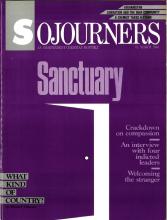I was seeking the pastor of a poor Catholic parish located somewhere on the outskirts of San Salvador. It had been a laborious search. Nobody in El Salvador, not even the most faithful of churchgoers, will tell you the name of their pastor. Not that they don't know. It is just that handing over a name to a stranger is treason in El Salvador.
Read the Full Article

Already a subscriber? Login
